Eden McCallum Economic and Business Outlook Survey – Q2 2025
Challenging times
When the news media are delivering an almost constant flow of startling developments, it can be hard for business leaders to maintain their focus and keep their cool. President Trump’s first 100 days have suspended “business as usual” until further notice. To find out how business leaders are facing up to these testing times, Eden McCallum surveyed over 200 firms in the UK, the Netherlands, and around the world to learn how current disruptive events are affecting attitudes and decision making.
A key finding is that pessimism about future prospects has increased dramatically, with negative sentiment returning to levels last seen at the height of the energy / cost-of-living crisis following Russia’s invasion of Ukraine. Businesses are trying to “keep calm and carry on”, but it is not easy.
Economic prospects
80% of respondents are now pessimistic about the global economic outlook over the next one to two years (more than double the 35% a year ago), while 62% are also worried about their home market. While there is more optimism about business prospects, this has also reduced sharply over the past year.
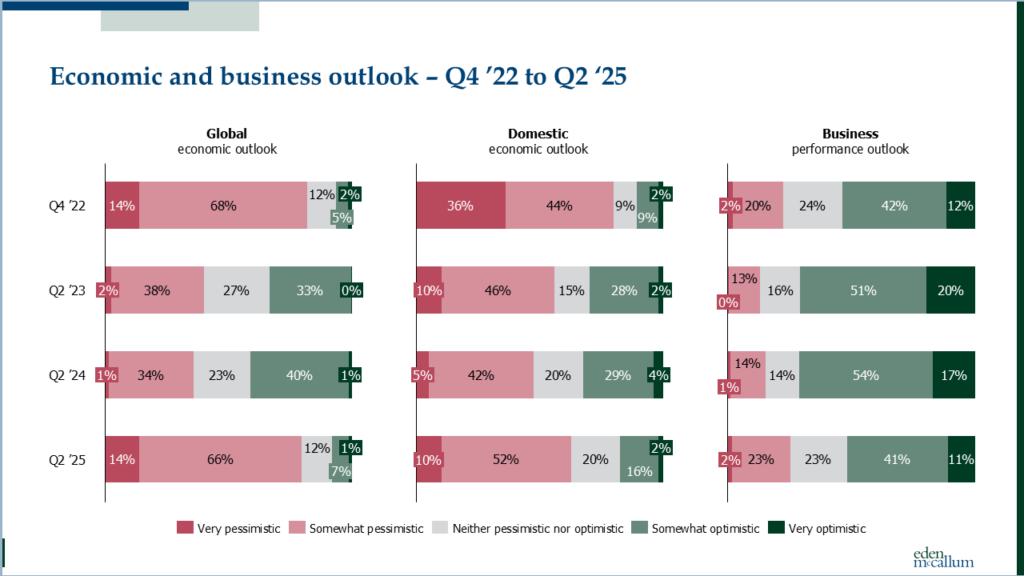
Business leaders in the UK are more pessimistic about their domestic outlook when compared with those in the Netherlands and the rest of the world – 76% are gloomy in the UK while only around 50% are elsewhere. British business leaders are also particularly concerned about the global economy – 85% are pessimistic.
Threats
It is clear what the biggest causes for concern are on the immediate horizon: geopolitical instability / conflict and the uncertainty / harm caused by trade barriers and tariffs. These factors were cited by two-thirds of respondents as a ‘top 3’ worry for their domestic economy. No other issue was mentioned as a potential problem by more than 25% of respondents.
Compared with a year ago, before the US election, concern around trade barriers / tariffs and volatile stock markets has more than doubled. Indeed, it has risen quite sharply even in the few months since Trump was elected, suggesting that the impact of the new administration may have been somewhat underestimated.
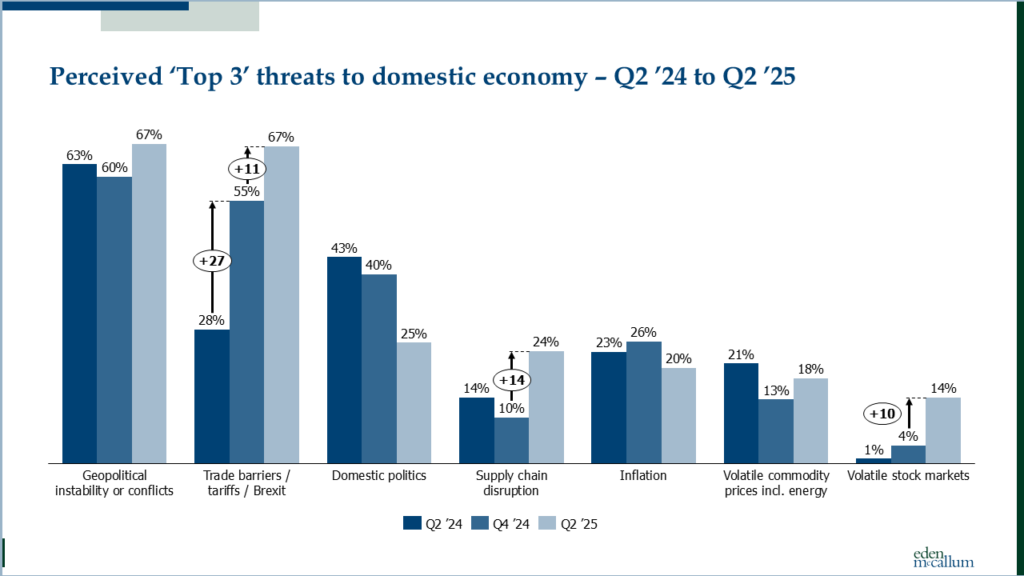
Business performance outlook
While business leaders remain relatively optimistic about future business performance, their optimism is much reduced: 52%, down from 71%, are optimistic about their future compared with a year ago. Leaders see geopolitical instability and changing customer demand as the most important external factors likely to have an impact on their company performance – just over 40% cite these as a ‘top 3’ issue. Trade barriers / tariffs are a close third (34%) – up from just 3% a year ago, when they were not even in the top dozen concerns.
Responding to tariffs
Business leaders overwhelmingly expect tariffs to have a damaging impact on their companies – 70% hold this view. Even firms with limited exposure to the US are expecting difficulties. Revenue, supply chains, and costs are thought likely to take the biggest hit.
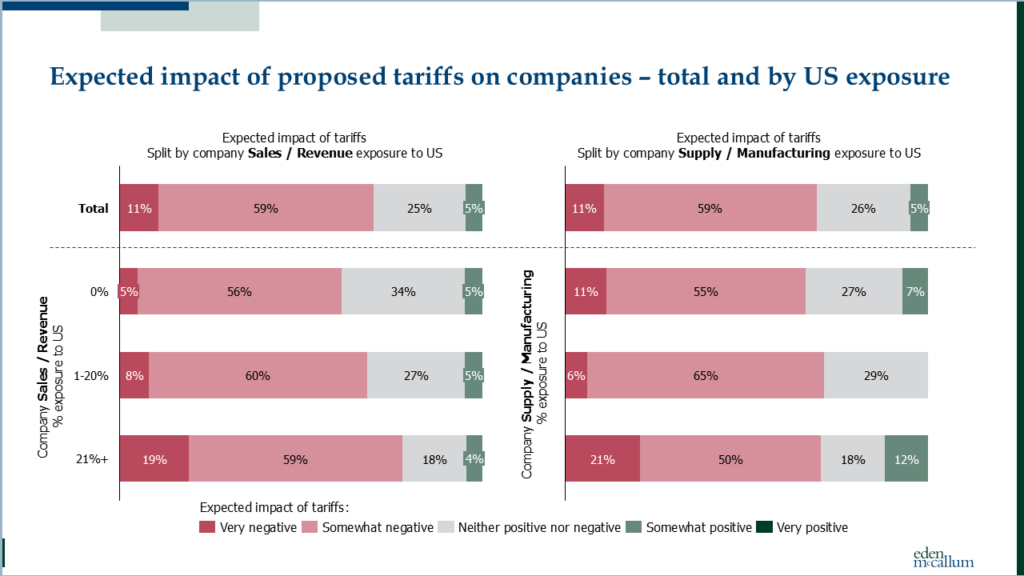
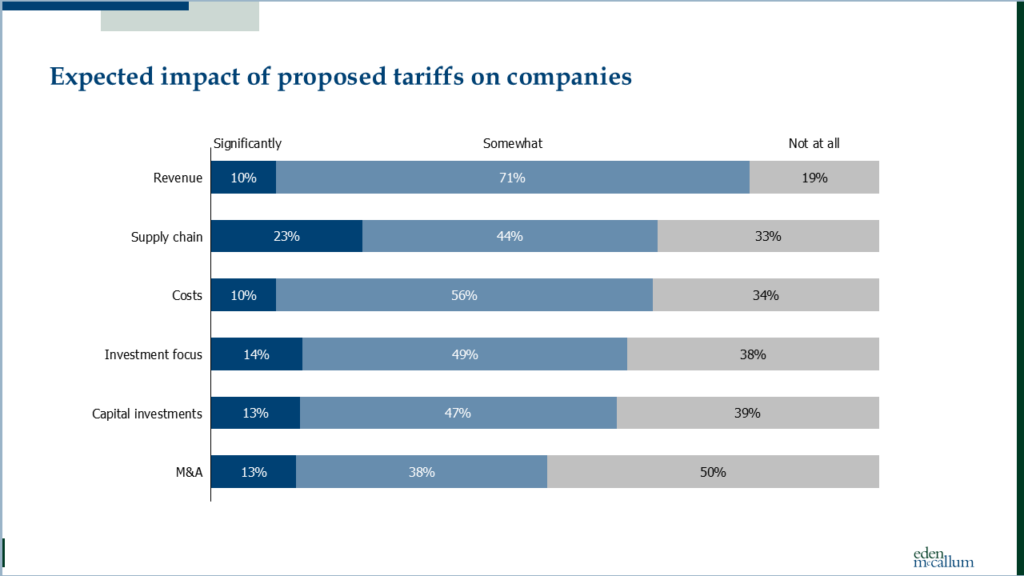
Only a minority of companies (16%) have already taken action in response to the proposed tariffs. The majority are either exploring options (37%) or expect to explore them (18%). Amongst those responding or expecting to do so, c. 25-30% have made changes to financial forecasts, supply chains, costs, pricing, and sales focus; and another c. 15-25% are currently planning action in these areas.
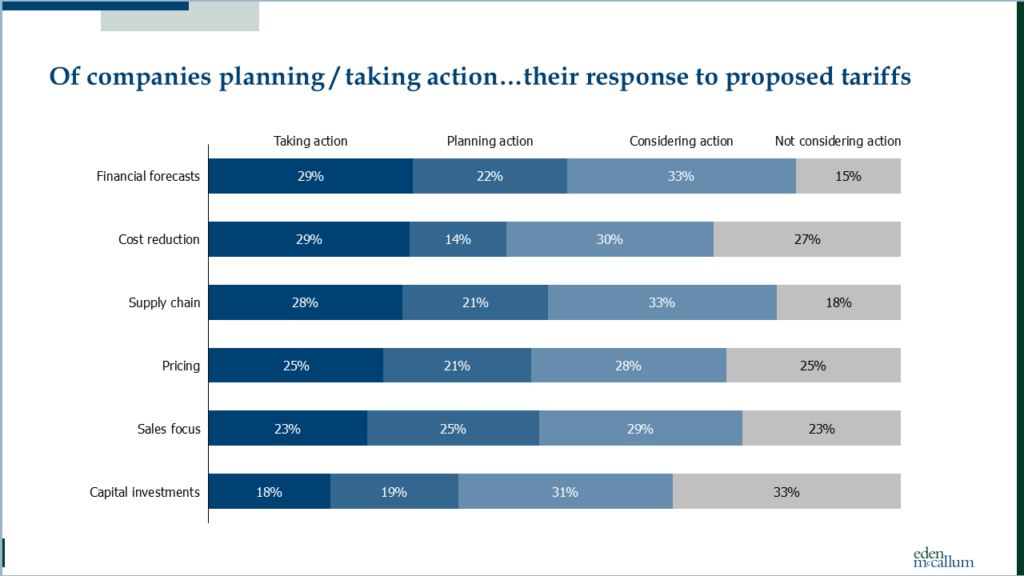
Preferred government reaction to the proposed US tariffs differs sharply between the UK and EU: two-thirds of British business leaders want the UK government to negotiate with Trump, whereas 40% of those in the Netherlands would like to see retaliatory tariffs (targeted or reciprocal) and only a quarter of Dutch business leaders would prefer their government to negotiate with Trump.
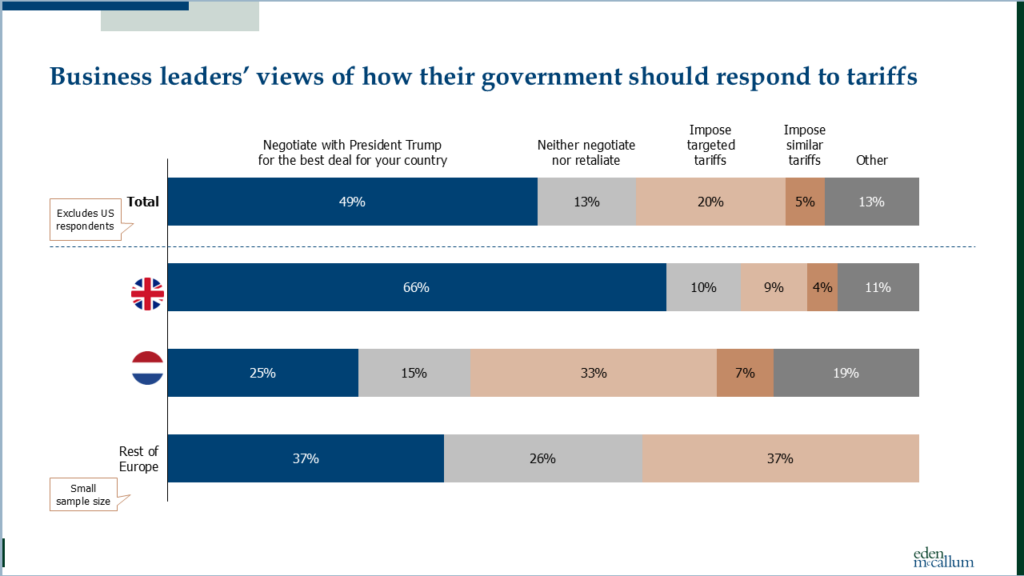
Internal business priorities – the rise of AI
In terms of internal priorities, the biggest shift over the past few years has been the rise of AI. Talent has been the clear number one issue since Covid, until this recent survey, where AI has taken the lead. And cost reduction, presumably because of concerns about tariffs and economic turmoil, has also moved up the list. According to our survey, the most important internal issues for business leaders are the use of AI (32%), talent (31%), and cost reduction (29%).
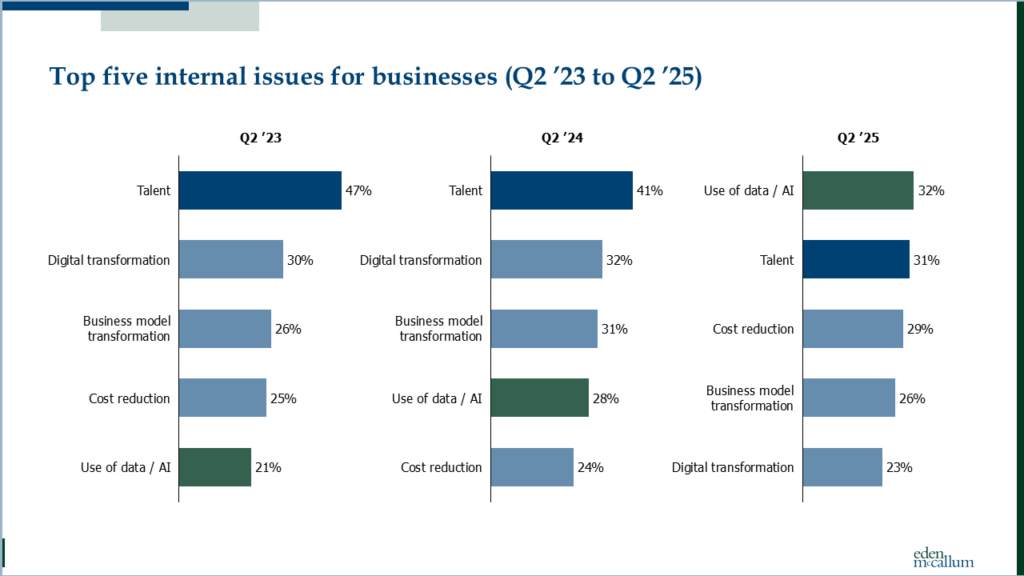
DEI and ESG
DEI already plays a substantial role in around half of the companies surveyed, with leaders describing it as “part of everything we do”. But a significant minority of businesses (around 20%) have changed or are considering changing their DEI policy since Trump’s election. Where companies are making changes to their DEI approach, these tend to be around communications and reporting.
Business leaders strongly agree that DEI is important to them personally (91% agree, of which 64% strongly agree), and broadly agree that DEI is core to their companies’ values (79%) and to optimising company performance (78%). But leaders are split on whether the DEI pendulum had gone too far, with c. 4 in 10 agreeing and a similar number disagreeing.
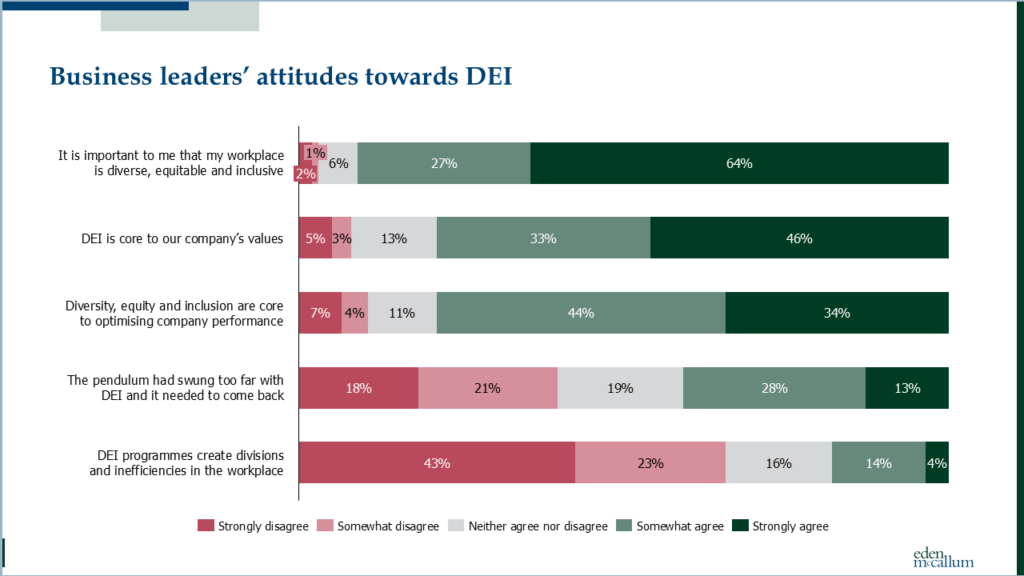
Business leaders’ concern about environmental sustainability has grown over the past six months, with 83% now saying they are personally concerned compared with 71% at the end of 2024. However, while a majority of business leaders have neither made nor planned to make changes to their environmental sustainability plans since Trump was elected, one-third are considering, planning or have already done so. Almost half of those making/planning changes are looking to increase the specificity of their targets; around a quarter say they are lengthening timelines.
“Brace, brace…”
Dena McCallum, co-founder of Eden McCallum, says that these destabilising times are testing business leaders’ nerve. “Having managed through Covid and the cost-of-living crisis, business leaders were finally becoming optimistic about the outlook in the second half of 2024. That has reversed sharply, and many of our clients’ have shifted their focus from growth and investment to cost reduction, supply chain agility, and pricing. In chaotic times calm execution at an appropriate pace will be more important than ever.”
Click here for the full survey results
Follow us on LinkedIn to remain updated

